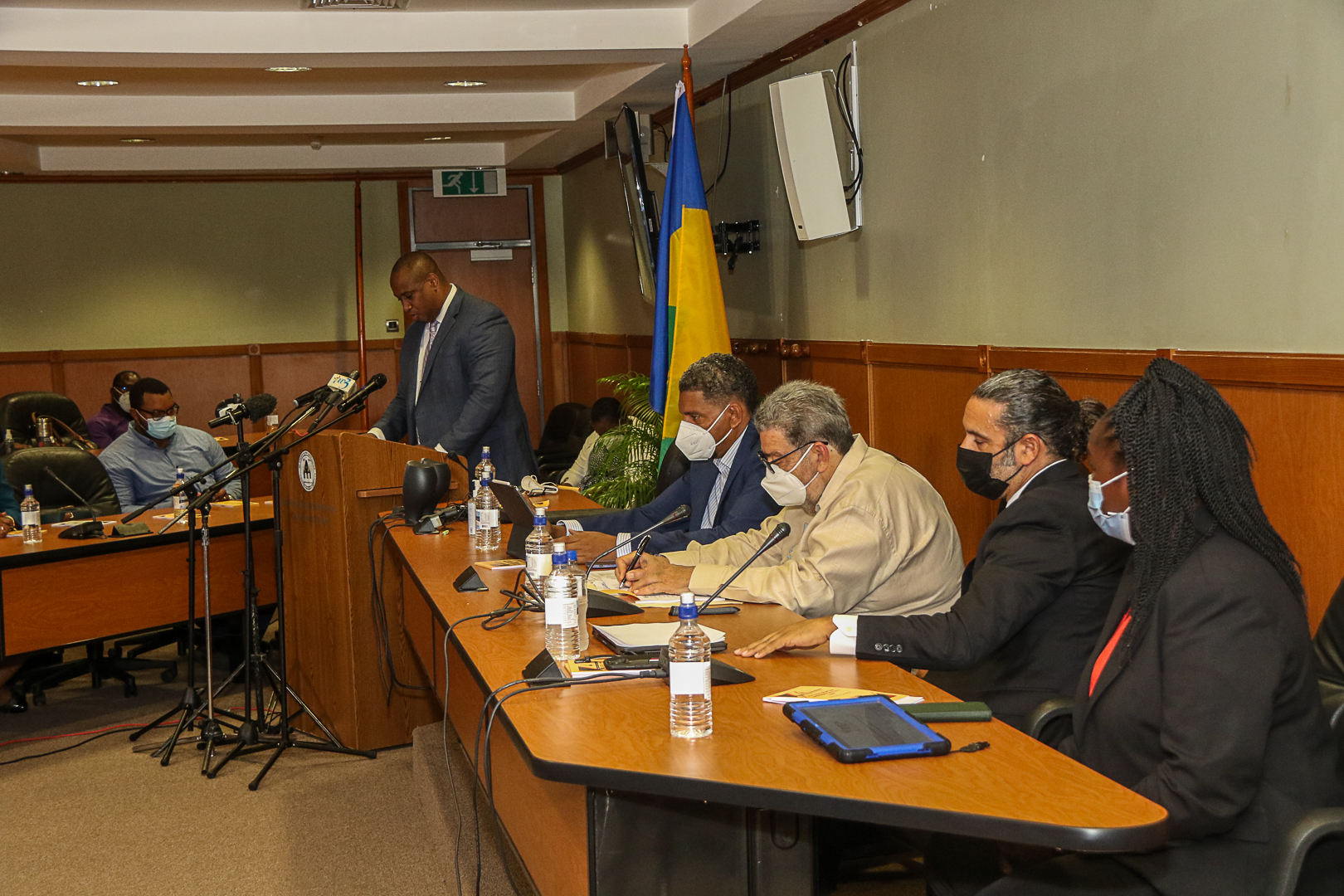[Kingstown, Saint Vincent] – Lauded as “well balanced and well-coordinated”, the Volcanic Eruption Emergency Project (VEEP) held its official launch on Thursday, July 28, 2022 at the National Insurance Services Conference Room, with an encouraging turn out from key stakeholders and partnering agencies.
The VEEP is a three-component project that seeks to support Saint Vincent and the Grenadines’ (SVG) efforts for restoration and delivery of critical services and support-resilient reconstruction – in response to the April 2021 volcanic eruptions. The Project is funded by the World Bank and the European Union and will provide short-term income support for negatively impacted citizens, as well as strengthen the Government’s capacity to prepare for and respond to national emergencies.
During his remarks, Minister of Finance, Economic Planning and Information Technology, the Hon. Camillo Gonsalves, highlighted the fact that the La Soufrière Volcano exploded 32 times last April, expelled over 500,000 tons of ash and debris across SVG and displaced one fifth of the population from the red and orange volcanic hazard zones.
“The impact of the volcanic eruptions – from a financial perspective, from a social perspective – [was] absolutely massive. Loss and damages were estimated, preliminarily… [at] EC$635 million… The social fabric of Saint Vincent and the Grenadines was rendered asunder by this volcano.”
Minister Gonsalves said that the VEEP is an important and significant contribution that will enable our multi-island state to “build back better, build resilience and restore ourselves to pre-volcano condition – and even better”.
He noted: “VEEP is all of us working together for the benefit and recovery of the people of Saint Vincent and the Grenadines… It is already changing lives and will play a critical part in our collective recovery.”
Delivering the feature address, Prime Minister Dr. The Hon. Ralph E. Gonsalves lauded the VEEP as a project that will bring about “tremendous good” in assisting the country to overcome this particular challenge. The Prime Minister also spoke highly of the Project’s implementing agency – the Economic Planning Division, of the Ministry of Finance, Economic Planning and Information Technology – and commended the various collaborating Ministries and agencies for their hard work and input.
He also highlighted the challenges that make SVG’s recovery more difficult – citing historical underdevelopment through colonialism, the COVID-19 pandemic and rising global costs among said challenges.
“I can’t wish the world to be different; I have to take it as it is and look for the development options within that context; and in our own case, to have a people-centred vision, the philosophy of advanced social democracy and elevating our Caribbean civilization,” he explained.
“This programme [VEEP]… is not only about rebuilding… It’s about fresh hope and love and faith made perfect in deeds.”
This was a sentiment echoed by Mr. Elad Shenfeld, the World Bank’s Senior Disaster Risk Management Specialist – who spoke highly of the World Bank’s experience dealing with the Government and its various Ministries and agencies, and in its interactions with the local population.
Giving remarks, Shenfeld explained: “Working in development, you come to understand that there cannot be development without resilience; and resilience is not only about infrastructure – it’s not about systems, it’s not about institutions. Resilience is about the human spirit, it’s about hope, it’s about togetherness, it’s about social solidarity, and it’s about faith despite all challenges. There is no World Bank loan or EU grant that can build the resilience of a nation.”
The World Bank representative said that the VEEP is a complex project that utilizes innovative approaches to disaster recovery, preparedness and response in such an impressive way that it was awarded the Vice Presidential Unit Award by the World Bank Board – among 70 nominations put forward in the Latin American and Caribbean category.
“This is an impressive accomplishment and this is due, in no small part, to the commitment, professionalism and the excellence of our government counterparts.”
Ambassador Malgorzata Wasilewska, Head of Delegation of the European Union to Barbados, Eastern Caribbean States, OECS and CARICOM/CARIFORUM, delivered remarks virtually.
Describing the project as “very promising”, Ambassador Wasilewska recalled the devastating events of April 2021, noting that the eruptions not only affected the well-being of those who had to be evacuated but also “had a pervasive impact on Saint Vincent and the Grenadines’ economy”. The EU Ambassador also honed in on the importance of resilience to the country’s recovery, not only from the volcanic eruptions but also from the COVID-19 pandemic and the consequences of climate change.
“Resilience makes the difference between continuation and abandonment, between success and failure, and most importantly, between life and death.”
She continued: “We recognize that the new challenges faced in the Caribbean call for more consistent approaches to resilience – which depends on stronger institutions, robust analytics and transparent prioritizations. We need to put new mechanisms in place, before a disaster strikes, to protect lives and livelihoods.”
In his welcome remarks, the Director of Economic Planning, Mr. Recardo Frederick, also noted the importance of the VEEP to the recovery process, and highlighted its significance to lives, livelihoods and the benefits it will bring to SVG.
“We were able to develop and negotiate an excellent project in record time,” said Frederick.
“The project… was designed to respond to the challenges with respect to agriculture, the supply of potable water, social protection, infrastructure development, early preparation for natural hazards and to address capacity limitations at NEMO – in response to emergencies.”
VEEP Project Coordinator, Mrs. Roxanne John, delivered an overview of the Project, which included project components, key agencies involved, achievements thus far and delved into some of the immediate targets / goals.
She pointed out that the VEEP must be “mindful of the environmental and social safeguards” that come with the progression of the Project – which will be achieved through the implementation of several instruments. Namely: Environmental and Social Management Framework, Environmental and Social Commitment Plan, Resettlement Policy Framework, Stakeholder Engagement Plan, Labour Management Procedures and the Grievance Redress Mechanism.
The VEEP became effective on December 10, 2021 and is expected to close on December 30, 2026. It is financed by the World Bank (US$40 million) and co-financed by the EU-funded Caribbean Regional Resilience Building Facility (US$2 million), which is managed by the Global Facility for Disaster Reduction and Recovery.
The implementing agency for this Project is the Economic Planning Division, which falls under the remit of the Ministry of Finance, Economic Planning and Information Technology.



